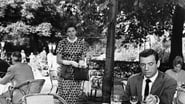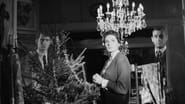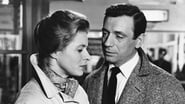Bardlerx
Strictly average movie
Matialth
Good concept, poorly executed.
Gary
The movie's not perfect, but it sticks the landing of its message. It was engaging - thrilling at times - and I personally thought it was a great time.
Lela
The tone of this movie is interesting -- the stakes are both dramatic and high, but it's balanced with a lot of fun, tongue and cheek dialogue.
Coastal Cruiser (boogielight@hotmail.com)
Part way through I found myself wondering why I was still watching the movie. It was nice to see Ingrid Bergman 20 years after making Casablanca, but I just couldn't care that much about her dilemma in this film.One major detraction is Anthony Perkins. He has no business being in this film. I know he belongs in 'Psycho', but I don't think he's a fit as Bergman's younger lover.What's great though is the many outdoor shots of Paris in the 60's. The automobiles. Wow! Really great street scenes, night shots of Paris, and again, those goofy looking cars.And then there's that knockout Jocelyn Lane. She's doesn't last the duration of the film however, and that's really too bad.So in essence I'm recommending the first third of this film.
secondtake
Good Bye Again (1961)Wow, such a beautiful and poignant look at fidelity and sacrifice in a relationship, just as the world is teetering from mid-20th Century stability to the 1960s and the free-for-all that meant for many. And the movie itself is one of the last, like "The Apartment" on this side of the Atlantic, to be made in the old Hollywood style, with invisible editing, gorgeous black and white photography, tight story construction, and a full, rounded sensibility that might, without being derogatory, be called "classic." I could watch it again today just for its perfect blending of acting, writing, filming, and tragic themes, which struck me hard.It's hard to believe this kind of movie didn't fly at the time, and hasn't made an impression since. Anthony Perkins is at his charming, disarming best here (he had just finished filming "Psycho"), and in some ways steals the show from the much bigger headliner, an amazing (as always) Ingrid Bergman. They make an unlikely screen couple, but a great one. The tensions between them are not only reasonable, their inevitable, or so the writing has made it seem. Which is perfect. The third star is a paradigm of old school suave European manliness, Yves Montand, quite wonderfully appealing and disgusting at the same time. Everyone is dressed great, thanks to costume design by Christian Dior. (There's even a comment by a rich older woman who says she's going shopping "to Dior's.")This is a very European feeling film, though it is of course an "American" movie in that it's in English, but it was officially made by the small production company, Argus, which otherwise made only French films. This was the era of the declining and disappearing studios, and one way a movie got made was exactly like this, patching together talents and money and location shooting. Making it a European film had the advantage of pushing some adult issues, which is what helps the film have relevance today. The director, Anatole Litvak, though an immigrant to the U.S., was thoroughly a Hollywood director, and overall this has the feel of the best of the great Golden Age movies, though updated of course by the realities of 1960s Paris. Along those lines, there is a great appearance of club jazz singer Diahann Carroll. For a really nice detailing of the film see the TCM article here: http://www.tcm.com/this-month/article/88170%7C0/Goodbye-Again.html or just google the title and TCM.
Carl Ian Schwartz
A literate script and excellent acting and direction elevate this love triangle to art.One of the best scenes, late in the picture, takes place on the dance floor of Maxim's and has NO dialog--just facial expressions culminating in a touching of hands.The original French title, "Aimez-vous Brahms?", is reflected here in the use of Brahms's Third Symphony. Again, the feeling is conveyed by the music and the facial expressions of the actors. This music, long familiar to me, took on a new meaning.This is a film made by adults for an adult audience--a 40-year-old audience will appreciate it, a younger audience will not.
Ed Uyeshima
It amazes me to find out that Anthony Perkins won the Cannes Film Festival Best Actor award for his skittish, petulant performance as Philip, the aimless, lovestruck "younger man" in this 1961 Paris-set soap opera about a May-September romance with Paula, a successful, fortyish interior decorator ensnared in a going-nowhere relationship with Roget, an age-appropriate transportation businessman who has casual affairs with young women he dubs impersonally as "Maisie". Naturally, Roget takes Paula for granted, which leaves her vulnerable to Philip's flirtatious advances. However, Perkins is an actor intractably tethered to his definitive role as Norman Bates in Alfred Hitchcock's "Psycho", and unfortunately in his first follow-up film, he emits such a creepy, obsessive tone that makes you fear more for Paula's life than her heart.On the upside is Ingrid Bergman's textured performance as Paula, and her mature beauty seems to reflect perfectly her saturnine situation. She is believably matched with Yves Montand as Roget in a performance that seems to echo his real-life situation with wife Simone Signoret when he embarked on a well-publicized affair with Marilyn Monroe the year before. Jesse Royce Landis shows up in her typical role as a pompous society matron, this time Philip's cheapskate mother, while Diahann Carroll shows up in a disposable cameo as a world-weary jazz chanteuse. Director Anatole Litvak paces the film a bit too leisurely and adds some silly but amusing touches like Paula's delusion of rain as she drives during a crying jag, but he creatively uses a circular structure to his plot by beginning and ending the film with almost the same scene. Adapting Francoise Sagan's "Aimez-vous Brahms?", screenwriter Samuel Taylor lends the sort of wry observations he contributed to his scripts for "Sabrina" and "Vertigo". As of March 2008, this film is not available on DVD.





